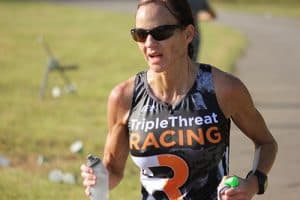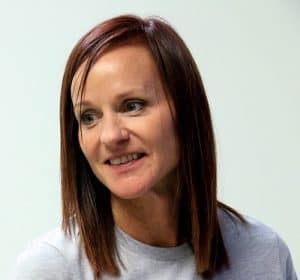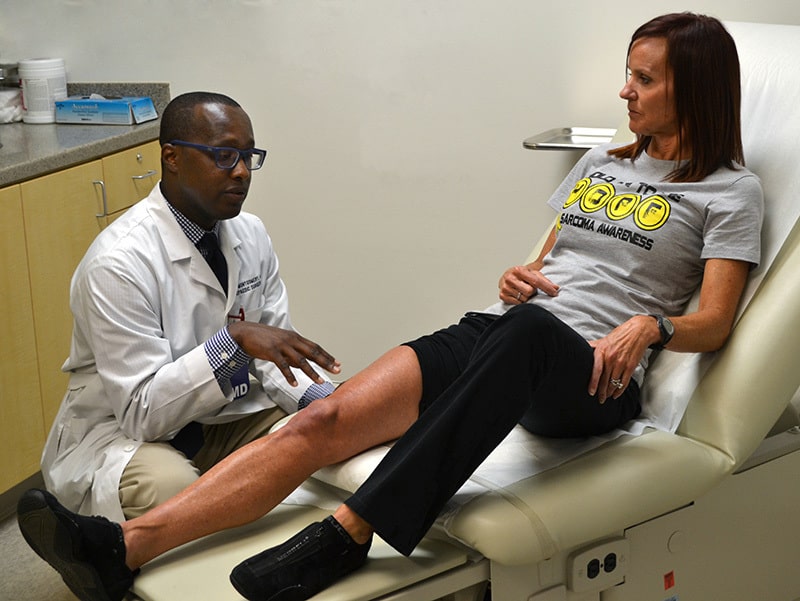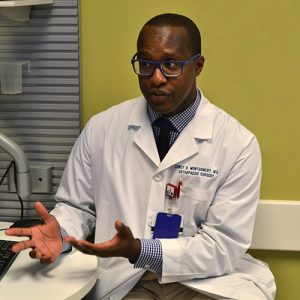Grateful Sarcoma Survivor Starts Charity to Fund Research
| Oct. 27, 2015 | Kristi Rogers is a woman on a mission. Her diagnosis with a rare form of cancer opened her eyes to the need for more research to help doctors better understand cancers that aren’t exactly household names.
Cancers like alveolar soft-part sarcoma (ASPS), an incredibly rare type of sarcoma, which is a malignancy of the connective tissues, bone, muscle, nerves and fascia that hold the muscles together.
So she has created a nonprofit with the goal of funding research. Her hope is that research will result in more answers for future sarcoma patients.

Kristi Rogers runs in the 2014 Trifest triathlon in Bentonville. The race is held by the Rampy MS Research Foundation, which funds multiple sclerosis research at UAMS.
Rogers’ battle against sarcoma started in March 2014. After successfully running a half-marathon in Bentonville where she lives, her iliotibial (IT) band, which is located on the outside of the thigh and runs from the hip to the top of the shin, was bothering her.
As she was massaging her thigh, she felt a small knot, which she assumed was scar tissue from overuse. After all, Rogers is an endurance athlete who had completed an Ironman long course, a one-day race in which participants swim 2.4 miles, bike 112 miles and then run a 26.2 mile marathon.
A doctor with whom Rogers worked examined her leg and told her that he didn’t think she was dealing with scar tissue, but rather a cyst or a tumor. He advocated a wait-and-see approach given the small size of the knot.
“You could barely feel it,” Rogers said.
Rogers’ dermatologist also wasn’t concerned about the knot, but recommended she go see an orthopedist if it didn’t get better.
Time passed and Rogers finally went to an orthopedist who couldn’t feel the small knot but proceeded with other tests. An ultrasound of her thigh showed a mass.
On Oct. 2, 2014, she went in for an MRI on her leg. After getting the results, the orthopedist told her it looked like cancer.
“He told me, ‘If it was me and my leg, I’d go to UAMS and I’d see Dr. Corey Montgomery,’” Rogers said.
Less than a week later, she was in Little Rock for an appointment with Corey Montgomery, M.D., an orthopedic oncologist in the UAMS Winthrop P. Rockefeller Cancer Institute.
“She had a mass that was located in her muscles in her thigh,” said Montgomery. “There are certain clues that are very suspicious for malignancy – size, location and recent growth. Unfortunately, she had all of those red flags.”
A biopsy confirmed his suspicions. Rogers had cancer, specifically ASPS.
There are roughly between 10,000-12,000 soft-tissue sarcomas diagnosed in the United States each year, Montgomery said. Of those, ASPS represents about 1 percent, meaning that approximately 100 patients each year will be diagnosed with the cancer.
Most soft-tissue sarcomas don’t respond well to chemotherapy, Montgomery said, so the “gold standard” of treatment is surgery and radiation, which is how he treated Rogers.
The little knot wasn’t so small after all. Montgomery removed from Rogers’ thigh a mass that measured 1.32 inches long, 0.88 inches wide and 1.12 inches high, or slightly smaller than a golf ball.
Nearly a year after her diagnosis, Rogers is doing well. Her latest MRI and CT scan showed no evidence of the disease. Since Montgomery released her from treatment Jan. 23, she is back running, competing in a shorter-distance triathlon as well as the Bentonville half-marathon where she first noticed something was wrong with her leg. She is training for a marathon in Sacramento, California, in December.
“I feel really good. I’m pleased biomechanically with how my leg works,” said Rogers. “I didn’t know what I’d be able to do again. I’m so blessed to have two legs and be able to walk.”

Kristi Rogers was diagnosed with a rare type of soft-tissue sarcoma. Now she is determined to fund research into all types of sarcomas.
But Rogers’ sarcoma story doesn’t end with her recovery.
During her treatment, she heard repeatedly that ASPS was incredibly rare and because it affects too few people, it gets very little research funding.
“God spoke to me very clearly and told me that I needed to use my skills and abilities” to raise money for research, Rogers said.
Her plan was to donate the money she raised to a charity that gave about 96 percent of funds to research. When she called the people who ran the charity, she discovered they were closing it after 15 years. That is when she decided to quit her job and form a nonprofit, Cancer Charity 4 Life.
Fundraising efforts are just beginning, but she plans for money raised through Cancer Charity 4 Life to go toward all types of sarcoma research at UAMS. Montgomery and his colleagues will be in charge of deciding which areas to focus on, she said.
“I felt like God was telling me to step up and step out and do something for others that might change things, not for my generation necessarily, but for those who are just being born.”

